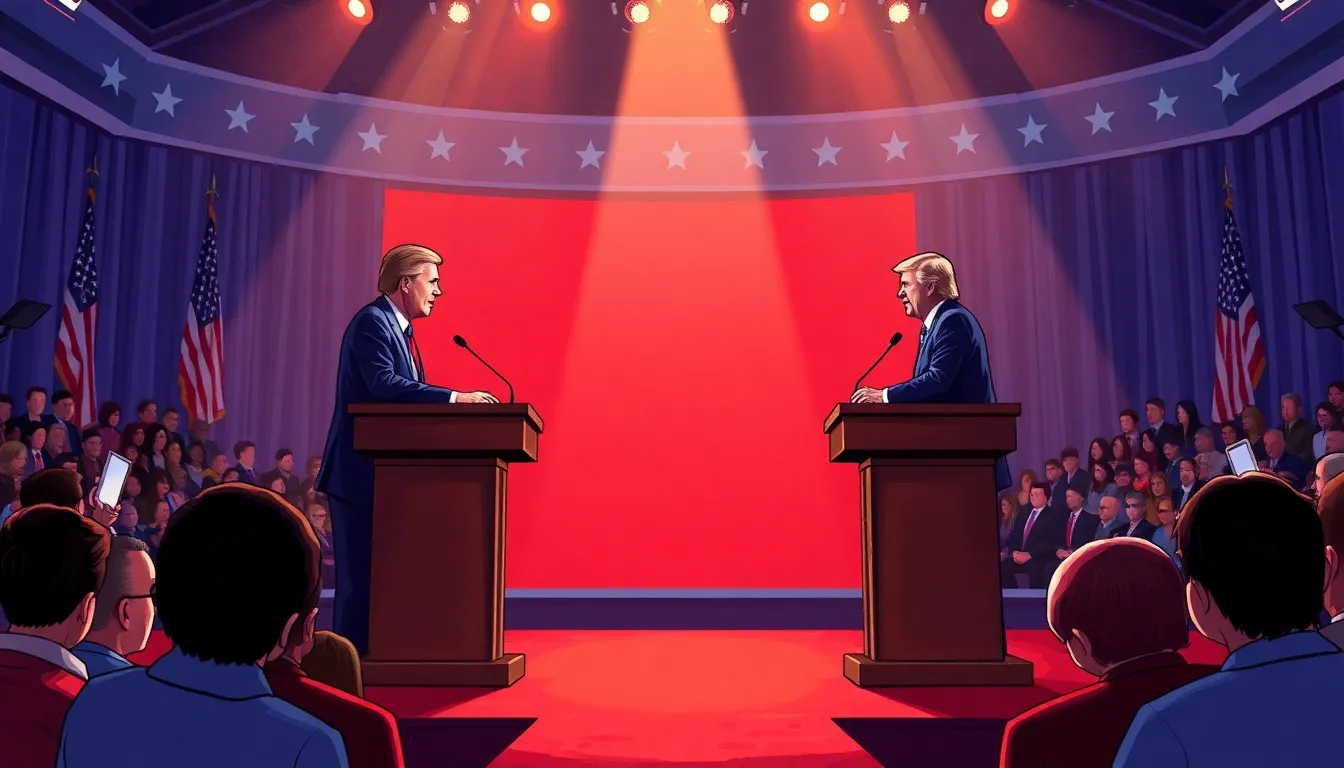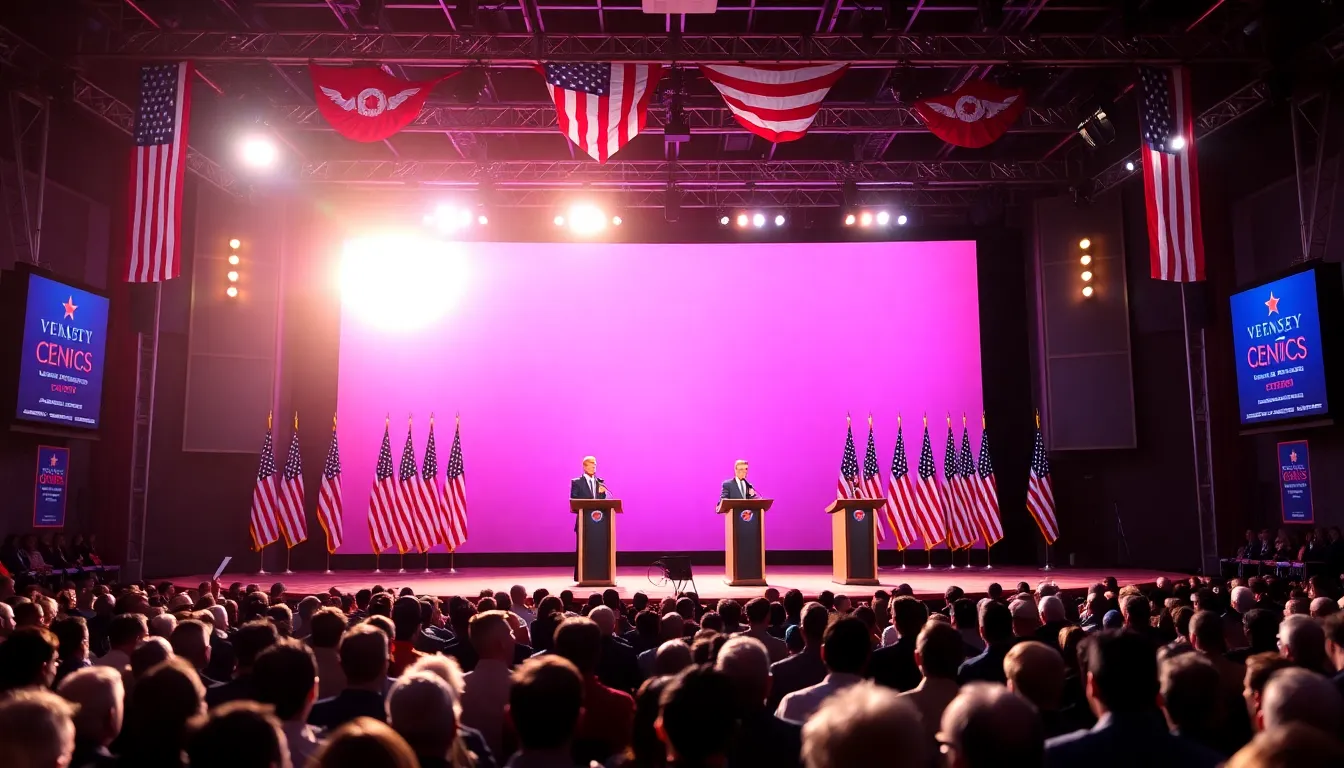As the political landscape heats up, all eyes turn to the vice presidential debate—a spectacle that promises to be both enlightening and entertaining. Mark your calendars because this event is where candidates get to showcase their charm, wit, and maybe even a few zingers. Who knew politics could be this much fun?
Table of Contents
ToggleOverview of the Vice Presidents Debate
The vice presidential debate offers a platform for candidates to showcase their positions on key issues. Scheduled for a specific date, this debate attracts significant attention from voters. Candidates engage in discussions that highlight their policy proposals and differences. Engaging moments often arise, providing memorable sound bites and insights into their personalities.
Each debate typically includes a moderator who guides the conversation and ensures it remains focused. Participating candidates address questions from both the moderator and audience members. Timing plays a crucial role, as candidates have limited minutes to articulate their views.
Reactions from the public and analysts often shape perceptions of the candidates following the debate. History shows that memorable performances can influence voter opinions and polling numbers. Highlighting contrasting political philosophies emerges as a common theme throughout the debates.
Past debates revealed how candidates leveraged humor and charisma to connect with the audience. This informal yet pivotal stage contributes to the overall political narrative leading up to elections. Audiences expect candidates to demonstrate a mix of confidence and relatability as they articulate their visions for the country.
Ultimately, the vice presidential debate serves as a crucial stepping stone in the election process. For voters, observing candidates in a dynamic setting provides insight into their leadership styles and readiness for office.
Historical Context of Vice Presidents Debates

Vice presidential debates hold historical significance, often influencing the political landscape. These debates provide insights into candidates’ personalities, approaches, and policies.
Notable Past Debates
The 1984 debate between Geraldine Ferraro and George H.W. Bush stands as a landmark moment. Ferraro’s strong performance garnered attention, energizing supporters. In 2008, Joe Biden and Sarah Palin faced off, showcasing contrasting styles. Biden’s experience met Palin’s fresh perspective, leading to memorable exchanges. Another pivotal debate occurred in 1960 when Henry Cabot Lodge and Lyndon B. Johnson revealed differing views on foreign policy. Each debate shapes the course of future elections through its dramatic exchanges and critical analysis.
Impact on Elections
Vice presidential debates can shift voter perceptions and influence election outcomes. Studies indicate that a strong performance can bolster candidates’ favorability ratings significantly. For instance, Biden’s confident delivery in 2008 helped solidify support for the Democratic ticket. Similarly, memorable moments often resonate with undecided voters. Candidates’ abilities to connect on key issues frequently predict polling shifts leading up to the election. Insights into candidates’ intentions and styles become clearer through these debates, ultimately aiding voter decision-making.
Schedule for the Upcoming Vice Presidents Debate
The upcoming vice presidential debate offers a key opportunity for candidates to express their viewpoints and engage voters. This debate includes important details regarding date, time, and location.
Date and Time
The vice presidential debate is set for October 7, 2024. Scheduled to begin at 9 PM Eastern Time, it allows viewers across the nation to tune in. Each candidate will receive equal time to present their arguments and answer questions, ensuring a fair and balanced exchange.
Location
The venue for this debate will be the University of Utah in Salt Lake City. This location plays a significant role in hosting political events, providing a platform that fosters lively discussions. Moderators and audience members will participate, creating an engaging atmosphere for candidates to showcase their policies.
Importance of the Vice Presidents Debate
The vice presidential debate serves as a pivotal moment in political campaigns, shaping perceptions and influencing undecided voters. This platform allows candidates to clarify their positions and engage in direct comparisons with their opponents.
Role in Political Campaigns
Candidates utilize the debate to showcase policy proposals and clearly articulate their priorities. Strong performances can significantly elevate favorability ratings, often translating into increased support among undecided voters. Historical trends indicate that memorable moments during debates can resonate with audiences, reinforcing candidates’ images. Debates act as a vital tool for party representatives, distinguishing their policies from those of the opposing party. They can also serve as effective response opportunities to any criticisms from opponents, highlighting candidates’ strengths while addressing weaknesses.
Audience Engagement
Engagement metrics from past debates emphasize the debate’s ability to capture public interest. Audiences actively monitor candidates’ reactions and interactions, which adds an emotional dimension to the political discourse. Viewers often seek to form connections with candidates, assessing charisma and relatability through their responses. Being informed influences voters’ perceptions, making the debate a critical touchpoint for public interaction. Candidates are challenged to resonate with the audience while maintaining focus on key issues. The excitement generated can foster increased voter participation and interest in the electoral process.
The upcoming vice presidential debate on October 7, 2024, promises to be a significant event in the election cycle. With candidates poised to showcase their policies and personalities, viewers can expect a dynamic exchange that may influence voter perceptions. The debate’s timing and format will allow for a fair discussion, making it an essential platform for candidates to connect with the electorate. As history shows, memorable moments can resonate deeply with voters, potentially swaying undecided individuals. This debate will not only highlight the candidates’ readiness for office but also serve as a critical moment in shaping the political landscape leading up to the election.




